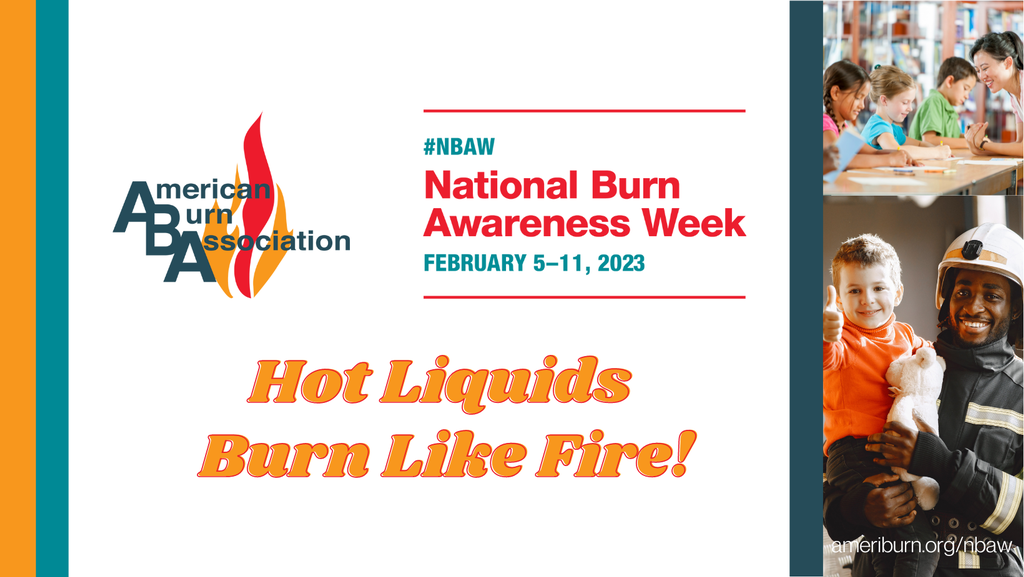| Safety Tips to Prevent Scald Injuries
A scald is any burn caused by a hot liquid or steam. Bathing and kitchen-related accidents are the most common causes of scalds and CAN be prevented. The Burn Center at Cooperman Barnabas offers tips to help make your home a safe environment.
If someone should sustain a scald injury, The Burn Center recommends the following:
1. Remove any wet clothing and run cool water over the burn to slow down the burning process.
2. Avoid using home remedies or ice which often makes a burn worse.
3. Seek IMMEDIATE medical attention by calling 9-1-1, visiting your physician or seeking emergency care at a hospital/burn center. Delaying treatment can result in a more serious injury.
Kitchen Safety
Stove/Oven
• Never leave cooking unattended.
• Keep the stovetop and oven clean, as a buildup of grease and debris can ignite easily.
• Keep stove area clear flammable materials. Don't leave oven mitts, paper or cloth towels near the stove.
• Dishtowels should never be hung on the oven door.
• Do not place or spray aerosols near an open flame.
• Cook on back burners and turn pot handles in to prevent accidental spillage.
• Wear close-fitting clothes and roll up sleeves. Turn stove top flames off before reaching above the stove.
Microwave Ovens
• Use only containers designed for microwave use.
• Allow food to cool before removing it from the microwave.
• Prevent steam burns by removing lids carefully. Stir thoroughly to distribute heat evenly.
• Never microwave a baby bottle.
Kid's Corner
• Create a “kid-free zone” around the stove/oven.
• Do not allow appliance cords to dangle within reach of small children.
• Keep hot liquids out of reach of children.
• Do not use tablecloths or placemats when small children are present.
• Do not cook on the stove, eat or drink hot foods while holding a child.
• Keep children out of the kitchen during hectic meal preparations. Assign older children to be responsible for younger children during this time if necessary.
• Store all matches and lighters up high, out of children's reach.
• Use child-resistant lighters.
Bathroom Safety
• Set water heaters at 120 F. Anything higher puts those in your household; especially small children and the elderly, at risk for scald injuries.
• Do not use hairdryers or other electrical appliances near the sink or a full tub.
• When preparing a bath for small children, remember to keep the water temperature no more than 101° F as their skin is more sensitive to heat. Have the children test the water themselves before getting in.
Heating Safety
• Space heaters need space - at least three feet away from anything that can burn - including furniture, drapes and rugs.
• Keep children and pets away from all heaters.
• Never leave heaters unattended.
• Refuel kerosene heaters with kerosene only, outside, after the heater has cooled.
• Always use an approved glass or metal protective screen in front of your fireplace.
• Store flammable materials like newspaper, kindling or wood away from stoves and fireplaces.
• Do not use throw rugs in front of the stove or fireplace.
• Have your chimney inspected by a professional once a year and have it cleaned if necessary.
• Use only dry seasoned wood in wood stoves and fireplaces.
• Addition of wood and attendance to the fire should be the responsibility of an adult.
• Have a fire extinguisher readily available.
• Never dispose of ashes, hot or cold, in anything but a metal can or bin.
Basement
• Always store paint and other flammable liquids in their original, labeled containers with tight-fitting lids and away from heat sources.
• Remove trash from your home.
• Don’t store anything near a furnace or water heater.
• Clean the lint trap on the clothes dryer after each use.
• If flooding occurs, turn off electrical circuits before stepping into the water.
Smokers
• Never smoke in bed or near flammables.
• Provide smokers with large, deep ashtrays and douse butts with water before discarding them.
• Douse butts with water before discarding them.
• Check around cushions and upholstered furniture for smoldering cigarettes before going to bed.
Outdoor Safety
Gasoline
• Gasoline should always be stored outside in a detached shed or garage, in small amounts, in an approved, sealed container out of reach of children.
• Never use gasoline or other flammable liquid as a cleaning agent.
• Never fill gasoline motors in an enclosed space, such as a garage.
• Before starting a lawnmower, snow blower, or motorcycle; move it away from gasoline fumes.
• Let small motors cool before you refuel them.
Grilling
• Never use gasoline to enhance or start a fire.
• Don’t add charcoal lighter fluid once the fire has started (use dry kindling to revive the flame).
• Use grills outside only, well away from buildings, vegetation and other combustibles.
• Supervise children carefully when a grill is used.
• Never allow horseplay around the grill. |
